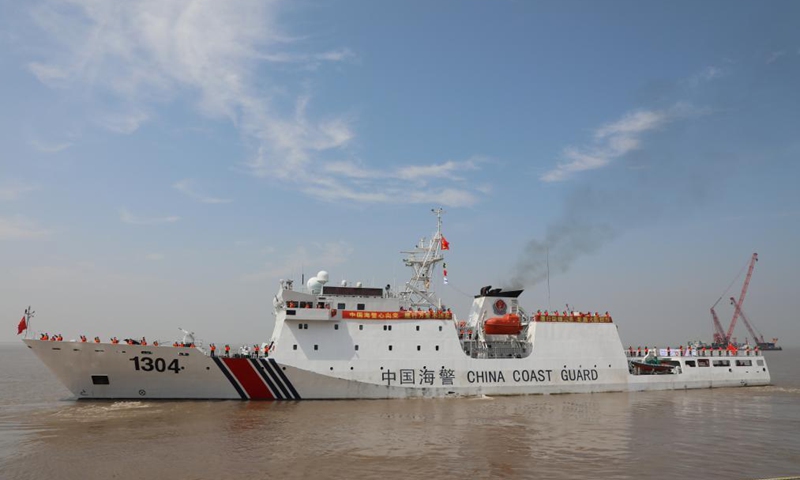Two China Coast Guard vessels will cruise on the high seas of the North Pacific Ocean during a 31-day patrol.The mission aims to strengthen supervision over the fishing boats operating on the seas of the North Pacific Ocean, in accordance with relevant United Nations General Assembly resolution and the Convention on the Conservation and Management of High Seas Fisheries Resources in the North Pacific Ocean.
Two coast guard ships dispatched by the China Coast Guard (CCG) departed from Shanghai on Friday for the North Pacific Ocean to enforce fisheries law.
The two vessels will cruise on the high seas of the North Pacific Ocean during a 31-day patrol, according to the CCG.

The mission aims to strengthen supervision over the fishing boats operating on the seas of the North Pacific Ocean, in accordance with relevant United Nations General Assembly resolution and the Convention on the Conservation and Management of High Seas Fisheries Resources in the North Pacific Ocean, said the CCG.
The coast guard ships will also crack down on illegal fishing and board to inspect fishing vessels suspected of violations, the CCG noted.
This is the first cruise mission of the Chinese coast guard ships on the high seas of the North Pacific Ocean since the passage of the coast guard law this year, said the CCG, adding that such missions are important to maintaining the fishery production order and protecting marine resources.
Source: Global Times, 31 July 2021
Background: China’s Deep Water Fleet
“China’s 14 Five Year Plan is the first FYP published since China committed to carbon neutrality, its climate and energy targets received the lion’s share of international attention. But the ocean also has far-reaching implications for international relations and governing the global commons. And the chapter on it in this year’s FYP contains language suggesting the extension of China’s environmental ideas overseas. A notable change in China’s 14 Five Year Plan is the call for development of “sustainable distant-water fishing” (DWF).
“Harmony between humanity and the ocean, win-win cooperation, and pushing forward with conservation of ocean ecologies,” were mentioned in the chapter introduction. This contrasts with the 13th FYP, where the language focused on developing the ocean economy and ocean resources.
The development of DWF was first mentioned in the 12th FYP, published in 2011, and the country’s capacity has increased rapidly ever since, now far outstripping all other countries. China’s DWF fleet operates in the waters of 40 countries and regions, and on the high seas of the Pacific, Indian and Atlantic oceans, as well as in Antarctic waters.

When it comes to international relations, there has been a shift from “protecting [China’s] ocean rights” in the 13th FYP to a more active “in-depth participation in global ocean governance”, promoting the establishment of a “fair and reasonable international ocean regime” and the development of “blue partnerships” and an “ocean community with a shared future for mankind.” According to Liu Nengye, director of the Centre for Environmental Law at Macquarie University, “China used to focus on cooperation with littoral [coastal] states, but as its capabilities in ocean industries such as ship-making and distant-water fishing have expanded, it has acquired the ability and experience to participate in the setting of international rules. The change in language could be seen as an intensification of the ‘marine world power’ strategy.”
On governance of the ocean environment, the Outline calls for more cooperation with other coastal states on monitoring, protection and research, and better study and assessment of strategic deep-sea resources and biodiversity.
On polar governance, the 14th FYP Outline also proposes an “Ice Silk Road” shipping route in the Arctic, alongside increasing capacities to participate in governance and utilisation of the Antarctic. In 2017, China hosted Antarctic Treaty talks for the first time, and in 2018 published a white paper on the Arctic, which Liu regards as landmark for China’s involvement in polar governance. He says that while there are international calls for protection of the poles, and in particular the Antarctic, China stresses a balance between protection and utilisation, and he sees the language in the 14th FYP Outline as a steady continuation of China’s polar policy.”
“Background” is an extract from China Dialogue, reported by China Environment News on 14 April 2021:
https://www.facebook.com/groups/2516109708443374/posts/3929200707134260
Leave a Reply
You must be logged in to post a comment.